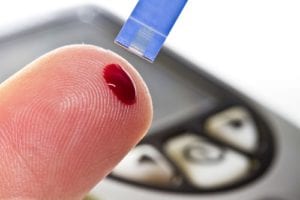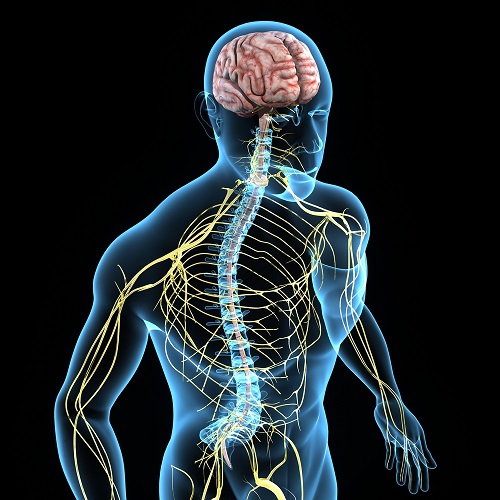Does Diabetes Affect the Nervous System? A person suffering from diabetes has high blood sugar level and when this blood sugar level is not maintained properly it affects different parts of the body including the nervous system. When you have diabetes your body may not be able to produce enough insulin or it may not be able to utilize the insulin effectively.
In either case the amount of sugar level in your blood remains high than it should normally be. Glucose is the main source of energy but when the sugar in your blood is not utilized it starts affecting other organs, even your nervous system.
The system of nerves or your nervous system is controlled by your brain. It is responsible for transmitting and processing different information within your body and helps in taking decisions. When the blood sugar level remains high for quite some time the blood vessels which feeds your nerves may get damaged and in turn the nerves may also get damaged.
When the nerves are damaged you may feel extremities in your lower leg and hands and this condition is known is diabetic neuropathy.
What is Diabetic Neuropathy?
Someone suffering from high blood sugar for over many years have chances of developing diabetic neuropathy. The most affected nerves of your body in this problem are those of your legs and feet.
The symptoms of this issue can vary depending upon the affected nerves of your nervous system. It can be simple numbness in your feet and legs to extreme pain in them. There may be problem in your urinary tract, digestive system, heart and even blood vessels. While some people have very mild complications some others may suffer from huge problem.
Diabetes affects the nervous system over a period of time and is a serious complications but it can be slowed down or even prevented if there is proper control over diabetes. Leading a healthy lifestyle and maintaining the blood sugar level is necessary for controlling diabetes.
Symptoms
The best way to control diabetic neuropathy is by controlling blood sugar level but along with that it is necessary that you understand different types of neuropathy issues so that if you find any complications in your body you can take advice from your physician immediately.
Four types of neuropathy are mainly found. It is possible that you may be suffering from any one of them or more than one. The symptoms of these will depend upon those nerves that are damaged.
Peripheral Neuropathy
Among different types of diabetic neuropathy it is the most common one. At first it affects your feet and legs and then your hands and arms. The signs of this problem are worst during night, mostly. They may include
- Reduction in your ability to feel any temperature changes or pain.
- Burning sensation and a tingling effect
- Sharp pains or cramps
- Issue with touching something, hands become highly sensitive
- Muscle weakness
- Loss of balance and coordination
- Loss of reflexes mainly in your ankles
- Different foot problems like infections, ulcers, joint and bone pain.
Autonomic Neuropathy
When diabetic affects the nerves of your heart, stomach, bladder, intestines, eyes and sex organs it is known as autonomic neuropathy. The symptoms may include
- Find difficulty in swallowing
- Uncontrolled diarrhea, constipation or both
- Problem in bladder including infection in urinary tract, incontinence or urinary retention.
- Lack of awareness about low blood sugar
- Decreased or increased sweating
- Eyes may not be able to adjust fast from light to darkness
- Issue with controlling the body temperature.
- High heart rate even during rest period
- Sudden drop in blood pressure after changing position from sitting to standing or vice versa. You may feel light headed or even faint
- Decreased sexual response
- Vaginal dryness
- Erectile dysfunction
Radiculoplexus Neuropathy
Also known as diabetic amyotrophy. In this type of neuropathy the nerves of your thighs, buttocks, hips or legs are affected. It is mainly found in people with Type 2 diabetes and older adults.
Normally the symptoms are found in one side of the body but gradually it may spread to other side too. They include
- Severe pain in thigh and a hip or buttock that may occur more than once in a day
- Thigh muscles become weak and shrinks eventually
- Finding difficulty in rising from a sitting position
- If abdomen is affected then there will be swelling in abdomen.
- Weight loss
Mononeuropathy
Also known as focal neuropathy, it is related to damage to any particular nerve in your face or middle of the body. It mainly occurs to older adults suffering from diabetes. It may strike you suddenly and you may experience severe pain.
The specific symptoms of this problem will depend upon the nerves that are affected. Mostly you may experience pain in
- Lower back or pelvis
- Shin or foot
- Front of thigh
- Chest or abdomen
When it affects your eyes and face you may encounter symptoms such as
- Double vision
- Difficulty focusing
- Aching behind one eye
When to See a Doctor


If you have any of the symptoms mentioned above and you are suffering diabetes for some time it is better not to avoid things. Get an appointment with your physician so that your problem can be detected at the earliest. You should get an appointment if
- You feel some tingling, burning, pain or even weakness in your feet or hands that is interfering with doing regular work.
- A sore or cut in your foot that is infected and is not healing properly
- Dizziness
- Changes in urination, digestion, or sexual function
Encountering these problems does not always ensure that you have nerve damage but you should undergo medical treatment as there may be some other issue that needs medical attention. You can prevent them or at least delay the whole procedure if you understand the cause and take care of them.
Causes
Harm to nerves and blood vessels
The precise reason likely varies for each kind of neuropathy. Scientists feel that after some time, uncontrolled high blood sugar harms nerves and meddles with their capacity to send signals, prompting diabetic neuropathy. High blood sugar additionally debilitates the dividers of the little blood (vessels) that supply the nerves with oxygen and supplements.
Be that as it may, a mix of variables may prompt nerve harm, including:
- Aggravation in the nerves brought about by an immune system reaction. The insusceptible framework mix-ups nerves as remote and assaults them.
- Genetic variables irrelevant to diabetes may make a few people bound to create nerve harm.
- Smoking and liquor misuse harm the two nerves and blood vessels and essentially increment the danger of disease.
Risk factors
Any individual who has diabetes can create neuropathy, yet these risk factors make you bound to get nerve harm:


Poor blood sugar control: Uncontrolled blood sugar puts you in danger of each diabetes entanglement, including nerve harm.
Diabetes history: Your danger of diabetic neuropathy builds the more you have diabetes, particularly if your blood sugar isn’t well-controlled.
Kidney ailment: Diabetes can harm the kidneys. Kidney harm sends poisons into the blood, which can prompt nerve harm.
Being overweight: Having a weight file (BMI) more noteworthy than 24 may expand your danger of diabetic neuropathy.
Smoking: Smoking strait and solidifies your veins, diminishing blood stream to your legs and feet. This makes it progressively hard for wounds to recuperate and harms the fringe nerves.
Complications That may occur over time
Diabetic neuropathy can cause various genuine complications, including:
Loss of a toe, foot or leg: Nerve harm can cause you to lose feeling in your feet. Foot injuries and cuts may quietly turn out to be seriously contaminated or transform into ulcers. Indeed, even minor foot bruises that don’t mend can transform into ulcers. In serious cases, contamination can spread deep down, and ulcers can prompt tissue passing (gangrene). Expulsion (removal) of a toe, foot or even the lower leg might be vital.
Joint harm: Nerve harm can make a joint fall apart, causing a condition called Charcot joint. This generally happens in the little joints in the feet. Manifestations incorporate loss of sensation and joint swelling, unsteadiness and in some cases joint deformation. Brief treatment can enable you to recuperate and forestall further joint harm.
Urinary tract diseases and urinary incontinence: In the event that the nerves that control your bladder are harmed, you might be not able completely void your bladder. Microscopic organisms can develop in the bladder and kidneys, causing urinary tract diseases. Nerve harm can likewise influence your capacity to feel when you have to pee or to control the muscles that discharge pee, prompting spillage (incontinence).
Hypoglycemia ignorance: Low blood sugar (underneath 70 milligrams for every deciliter, or mg/dL) typically causes precariousness, perspiring and a quick heartbeat. Be that as it may, in the event that you have autonomic neuropathy, you may not see these notice signs.
Sharp drops in blood weight: Harm to the nerves that control blood stream can influence your body’s capacity to change blood weight. This can cause a sharp drop in weight when you remain subsequent to sitting (orthostatic hypotension), which may prompt dazedness and blacking out.
Stomach related issues: On the off chance that nerve harm strikes your stomach related tract, you can have clogging or the runs, or episodes of both. Diabetes-related nerve harm can prompt gastroparesis, a condition where the stomach purges too gradually or not under any condition. This can meddle with processing and seriously influence blood sugar levels and nourishment. Signs and indications incorporate queasiness, regurgitating and swelling.
Sexual dysfunction: Autonomic neuropathy regularly harms the nerves that influence the sex organs. Men may encounter erectile dysfunction. Ladies may experience issues with grease and excitement.
Expanded or diminished perspiring: Nerve harm can upset how your perspiration organs work and make it hard for your body to control its temperature appropriately. A few people with autonomic neuropathy have over the top perspiring, especially around evening time or while eating. Excessively next to zero perspiring by any stretch of the imagination (anhidrosis) can be perilous.
Overseeing Diabetic Neuropathy Intricacies
Counteractive action
You can forestall or postpone diabetic neuropathy and its intricacies by keeping tight control of your blood sugar and taking great consideration of your feet.
Blood sugar control
Utilize an at-home blood sugar screen to check your blood sugar and ensure it reliably remains inside objective range. It’s essential to do this on calendar. Moves in blood sugar levels can quicken nerve harm.
Foot care
Pursue your primary care physician’s suggestions for good foot care.
Foot issues, including injuries that don’t recuperate, ulcers and even removal, are a typical confusion of diabetic neuropathy. In any case, you can avoid a considerable lot of these issues by having a far reaching foot test in any event once per year, having your primary care physician check your feet at every office visit and taking great consideration of your feet at home.
To secure the well-being of your feet:


- Check your feet consistently. Search for rankles, cuts, wounds, broke and stripping skin, redness, and swelling. Utilize a mirror or ask a companion or relative to help look at parts of your feet that are difficult to see.
- Keep your feet perfect and dry. Wash your feet consistently with tepid water and mellow cleanser. Abstain from dousing your feet. Dry your feet and between your toes cautiously by smearing or tapping with a delicate towel.
- Saturate your feet altogether to counteract splitting. Abstain from getting cream between your toes, be that as it may, as this can energize parasitic development.
- Trim your toenails cautiously. Cut your toenails straight over, and document the edges cautiously so there are no sharp edges.
- Wear perfect, dry socks. Search for socks made of cotton or dampness wicking strands that don’t have tight groups or thick creases.
- Wear padded shoes that fit well. Continuously wear shoes or shoes to shield your feet from damage. Ensure that your shoes fit appropriately and enable your toes to move. A podiatrist (foot specialist) can show you how to purchase appropriately fitted shoes and to counteract issues, for example, corns and calluses.
On the off chance that issues do happen, your primary care physician can help treat them to counteract progressively genuine conditions. Indeed, even little injuries can rapidly transform into serious diseases whenever left untreated.
A person suffering from diabetes has high blood sugar level and when this blood sugar level is not maintained properly it affects different parts of the body including the nervous system. When you have diabetes your body may not be able to produce enough insulin or it may not be able to utilize the insulin effectively.
In either case the amount of sugar level in your blood remains high than it should normally be. Glucose is the main source of energy but when the sugar in your blood is not utilized it starts affecting other organs, even your nervous system.
Conclusion
Does Diabetes Affect the Nervous System? The system of nerves or your nervous system is controlled by your brain. It is responsible for transmitting and processing different information within your body and helps in taking decisions. When the blood sugar level remains high for quite some time the blood vessels which feeds your nerves may get damaged and in turn the nerves may also get damaged.
When the nerves are damaged you may feel extremities in your lower leg and hands and this condition is known is diabetic neuropathy. You want to always control your blood sugars because that is the nest way to avoid neuropathy and issues with your nervous system!
- Amazon Kindle Edition
- Rothchild, Sascha (Author)
- English (Publication Language)
- 336 Pages - 04/19/2022 (Publication Date) - G.P. Putnam's Sons (Publisher)
- ✅ QUICK AND EASY TO USE: Care Touch blood sugar test kit delivers results in only 5 seconds with just a 0.5µL blood sample. There is no programming needed since our blood sugar monitor kit automatically recognizes batch codes encrypted on Care Touch glucose test strips. Our state-of-the-art glucometer kit with strips and lancets includes single-touch strip ejection, so you can hygienically remove used diabetic test strips.
- ✅ EASY DIABETIC MONITORING: The blood sugar monitor kit with strips is capable of saving up to 300 readings. The blood glucose test kit also provides a continuous 14-day average of your readings, making glucose monitoring easy for you and your healthcare provider.
- ✅ PORTABLE AND HASSLE-FREE: The diabetic testing kit comes with a handy glucometer case, which means you can check your blood sugar level at home or anywhere else while staying organized. The 10-depth lancing device and lancets will help make blood sugar testing almost painless and hassle-free.
- ✅ COMPLETE DIABETIC SET: The glucose meter kit with strips and lancets includes: (1) Care Touch Blood Sugar Meter, (100) Blood Glucose Test Strips for diabetes, (1) Lancing Device, (100) Lancets for diabetes testing, (1) 3 Volt Lithium Battery, (1) Glucose meter case for your blood sugar tester and diabetic supplies
- ✅ WE CARE BECAUSE YOU CARE: You care about your health, and we care about you. Care Touch is committed to providing the best quality blood glucose monitoring systems. Our care doesn’t end when your sugar tester diabetes kit arrives at your door. We’re fully dedicated to your satisfaction. If you have any questions or concerns about your glucose monitor kit with strips and lancets - contact us at any time.
- Amazon Prime Video (Video on Demand)
- English (Playback Language)
- English (Subtitle)
- PUREHEALTH RESEARCH - Blood Sugar Formula 3 Bottles
- MANUFACTURED in the USA! 365-DAY SATISFACTION GUARANTEED!
- A DOCTOR-APPROVED NATURAL FORMULA. Seventeen potent ingredients, each scientifically proven to have a significant effect at helping balance your glucose levels, improve glucose sensitivity, protect delicate cells from free radicals, and energy
- HIGH POTENCY. PureHealth Research experts scientifically enhance CHROMIUM with the Vitamin C, E, Mulberry Leaf, Bitter Melon, Cinnamon, L-Taurine, Berberin and other ingredients which are proven to help you support healthy blood glucose levels
- ONE CAPSULE DAILY, THREE BENEFITS: supports healthy sugar and carb absorption, supports insulin levels, supports cardiovascular health
- Scientifically formulated; great care was put into combining just the right amount of 20 different ingredients into a premium formula designed to support healthy blood sugar levels
- High potency support for 365 days a year; the unique combination in this blend is crafted to help support healthy glucose absorption and glucose production by your body; contains Gymnema, Alpha Lipoic Acid, Yarrow, Licorice, Cayenne, Banaba, Guggul, Bitter Melon, Juniper Berry, White Mulberry, L-Taurine & more
- One capsule twice a day, five benefits; (1) supports normal blood sugar levels; (2) supports weight control and energy; (3) supports healthy sugar and carb absorption; (4) supports insulin levels; (5) supports heart health; daily support for healthy blood glucose levels, 365 days a year
- Reliable; made in a GMP certified facility in America and third party safety tested for purity
- Great value for money; 120 vegetarian capsules for a 60 days supply
Last update on 2022-06-23 / Affiliate links / Images from Amazon Product Advertising API











Interesting question as I hadn’t really considered how diabetes affects the nervous system until now. I know that diabetes can be extremely debilitating at times, so it makes sense that the nervous system would be affected in this way. I’m always looking for natural remedies. Thank you for the background information on Diabetic Neuropathy. You’ve brought great awareness to the different causes and symptoms. I’ll definitely be conscious of my blood sugar levels, thank you!
Hey Pentrental 🙂
Diabetes affects every part of your body and the nervous system is no exception.
For me, it’s neuropathy and the numbness in my feet and I am doing everything possible to alleviate this condition.
Diabetes can cause more than neuropathy when it comes to your nervous system.
But the key here is early detection and treatment so that you can control the diabetes and it won’t have such a severe effect on you.
Natural ways are the best ways to combat this situation!
Thank you for you comments!
Now I understand the nervous system in relation to diabetes. It is a very good health topic you have decided to talk about here and I really enjoyed reading it. My aunt had diabetes but i have noticed any of this symptoms you mentioned here but if I ever do, I know how to handle it thanks to you. I didn’t know about glucose in relation to diabetes so that’s an added knowledge for me.
Hi Henderson,
I wanted to speak about the nervous system in particular because it’s affected me with neuropathy.
The constant numbness in my feet can be overbearing at times. It’s all from the diabetes.
Since diabetes affects everything, it’s important to know just what it can do to your nervous system.
Not being deficient in B vitamins is a huge help. That only adds to it. It takes a toll on your nervous system too.
Thank you for your feedback!
OMG! I never thought diabetes could be this much dangerous. To be honest, I always thought it only deals with high sugar level and overtime if well treated, would ensure that it is reduced. Diabetes neuropathy is really serious and the best way to prevent this is to constantly go for blood tests and to maintain closer contact with doctors. I heard alcohol is extremely bad for people with diabetes and that it aids the damages of their body nerves. Thanks so much for giving this much detailed information on diabetes and the various ways it affects the nervous system. Also, seeing that it can affect sexual organs too, that is bizarre.
Thanks for sharing all these sensitive information!
Hey Tracy 🙂
Diabetes is about the most serious disease you can have! It just does everything negative to your body.
The nervous system can take a beating from this terrible disease.
I try and inform folks that just because you’re diagnosed, doesn’t mean your life is over.
This is far from the truth as long as you get it under control!
Neuropathy can be mild or severe. It depends on how early you do something about it.
See your doctor at the signs of any symptoms!
Appreciate your input!
My uncle is a diabetic and he is very adamant whenever it comes to him keeping close tabs with his doctor. Most times, he still denies that he is okay all in the name of religion and miracles. I will definitely share all the information in this article with him because he needs to realize the kind of dangers he is putting himself into by being stubborn towards his treatments. Diabetes truly can damage the body nervous system.
I appreciate you for sharing all these.
Hey Rodarrick!
Sorry to hear that your uncle has diabetes. It’s just way too common to hear about these days.
It affects everything in your body including the nervous system.
I know first hand because I have neuropathy in my feet and it’s horrible.
I feel that everyone should be aware of diabetes and what it can do not only to your nervous system, but to your whole body.
Thank you for your thoughts 🙂